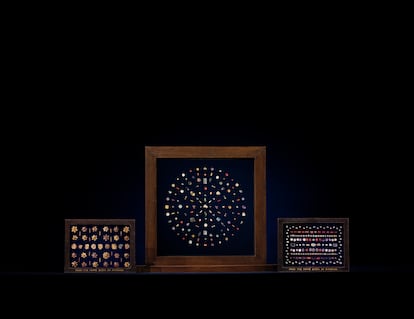The Hong Kong headquarters of the important auction house Sotheby’s suspended the sale of 300 Buddhist sacred relics that I had scheduled for this Wednesday, after receiving a legal notice presented by India for the immediate repatriation of the pieces, according to Efe confirms. “In the light of the issues raised by the Government of India and with the agreement of the consigners, the bid of the Piprahwadel Historic Buddha has been postponed,” said Sotheby’s in a statement, where he also said that “this will allow discussions between the parties” and that it will share any update “as appropriate.”
The relics include bone fragments, chests, jewels of precious stones whose value, according to the auction house, is around 100 million dollars (88 million euros). They were buried in a funeral monument in Piprahwa, in the current Uttar Pradesh, India, between 240 and 200 a. C., and were supposedly mixed with some of the cremated remains of Buddha. William Claxton Peppé, a British landowner, found the gems in 1898 in an excavation he did on his property on the archaeological site of Piprahwa, recognized as the hometown of Buddha. A significant part of these objects was delivered to the Indian Museum of Calcutta a year later, in 1899, and is protected by the legislation of that country, which prohibits its sale or export. But another small collection was in CLIXTON hands.
Chris Peppé, one of the three heirs and great -grandson of Cloxton, defended that what remained in his family is “only a small part” of the discovered treasure that the Indian government allowed its great -grandfather to conserve. “He delivered the precious stones, the relics and the reliquaries. The bone relics (supposedly Buddha) were given to the King of Siam and all the great pieces of gold and jewelry were donated to the Imperial Museum of Calcutta (today Indian Museum),” he wrote in an open letter spread by Sotheby’s.
India considers sale illegal
The Ministry of Culture of India sent a legal notice to the auction house requesting the suspension of the tender and claiming the repatriation of objects “for their religious conservation and veneration.” The notification, aimed at the Hongkonese art market and Chris Peppé, argues that the sale “violates Indian and international laws, as well as the United Nations conventions.” The Indian government also requested the intervention of its diplomatic missions in the United Kingdom and East Asia, and activated its financial intelligence unit to coordinate measures with the Hongkonese authorities. He also asked Sotheby’s and Chris Peppé to issue a public apology from the Indian government and Buddhists from all over the world and added that he would launch a public campaign to highlight the role of the auction house “in the perpetuation of colonial injustice and to become part of the sale of a little ethical sale of religious relics.”
The owner, television director and film editor residing in Los Angeles, defends that since he received the pieces, he and his cousins have worked to make them accessible to the public, ideally to a Buddhist audience, at no cost for the institutions that exhibit them. They have lent them to prestigious museums around the world, such as the Rietberg Museum in Zurich, the Rubin Museum of Himalayo Art, the Metropolitan of Art in New York, the Museum of Asian civilizations in Singapore or the National of Korea in Seoul.
In addition, Peppé created a website, The Piprahwa Project, where you can access all the research materials collected, including William Claxton’s letters that authenticate the discovery, and which were donated to the Royal Asatic Society. “At the end of our custody of Piprahwa’s relics, I hope they go to someone who really values them. I long for many people to see them and connect with the Buddhists who offered them more than two thousand years ago, as well as with Buddha and their teachings,” he added.

